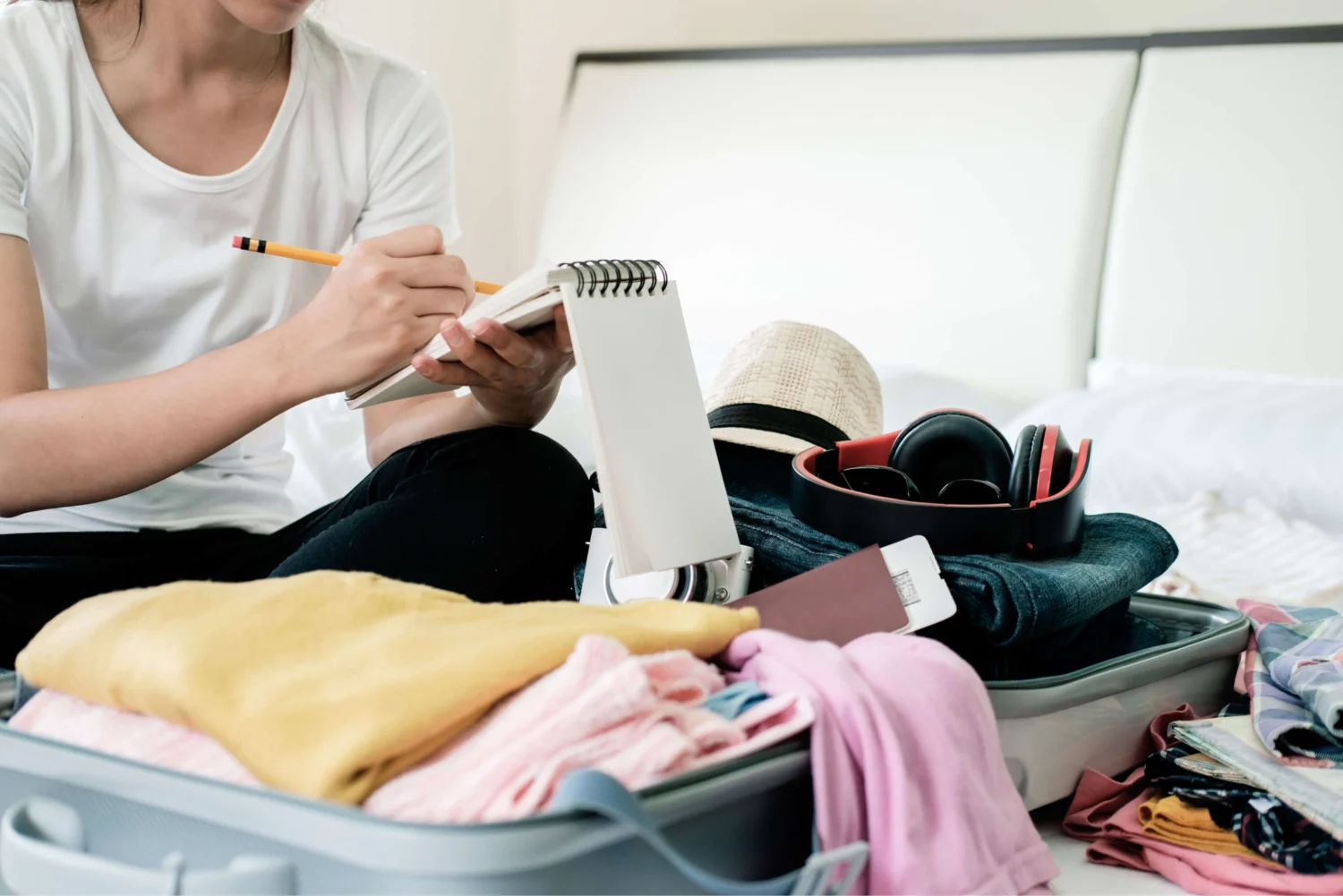Preparing for inpatient rehab is a big step—and packing the right items can make the transition easier. When you bring the things you need, you’ll feel more comfortable and better able to focus on what really matters: your healing.
Being organized helps take away some of the stress before entering the facility. You want to arrive ready, not worried. This packing list will help you prepare with confidence, covering everything you’ll want to bring—and what to leave at home.
From clothing and personal care items to comfort items and important documents, this list is designed to support your daily needs during the duration of your stay. Being prepared ensures your focus stays on treatment and recovery, not on missing necessities.
If you have questions about inpatient rehab for addiction or mental health, contact Rock View Recovery today. Our team is here to support you every step of the way.
Essential Documents & Personal Items
There are a few documents and personal items that are absolutely essential for your stay in inpatient rehab. These ensure your intake process goes smoothly and allow staff to provide safe, effective care from the moment you arrive.
- Identification: A driver’s license, state-issued ID, or passport will be required at check-in to verify your identity.
- Insurance Card and Paperwork: Bring your insurance card and any pre-approval or authorization letters you may have received. This helps speed up the admissions process.
- Medical Information: Include a written list of current medications, known allergies, medical diagnoses, and the contact information for your primary care doctor or mental health provider.
- Payment Method: Some facilities may ask for a credit or debit card for co-pays, pharmacy needs, or incidental expenses. Check with the admissions team ahead of time.
- Emergency Contacts: Write down the names, phone numbers, and relationship of at least two emergency contacts.
- Journal or Notebook: This can be used for notetaking during therapy, personal reflection, or counseling exercises. Many clients find journaling to be one of the most helpful tools during rehab.
Having these items in order reduces stress and helps you start your program feeling confident and ready.
Comfortable Clothing & Footwear
Comfort plays a big role in how you feel each day during your treatment. You’ll participate in group sessions, daily routines, light physical activities, and mealtimes, so it’s best to pack modest, easy-to-wear clothes that allow you to move freely and stay focused.
Clothing to Pack:
- T-shirts, sweatshirts, long-sleeve shirts
- Loose-fitting pants, leggings, or sweatpants
- Comfortable pajamas, a robe, and plenty of undergarments
- Weather-appropriate clothing, including layers like a hoodie or lightweight jacket
- Seasonal extras: coat, scarf, gloves, or sunhat depending on the time of year
Many facilities provide laundry access, so bring enough clothes for about a week. Choose breathable, machine-washable fabrics that are easy to care for. Labeling your items with your name can also help prevent confusion in shared laundry spaces.
You may also want to bring workout clothes for movement therapy or wellness activities, as some programs incorporate light exercise as part of recovery. Don’t forget a small laundry bag to keep dirty clothes separate.
Footwear to Bring:
- Sneakers or walking shoes for light exercise and movement
- Slip-on shoes for convenience around the facility
- Flip-flops or shower sandals for hygiene in shared bathroom areas
Avoid bringing clothing with offensive language, drug references, or overly revealing designs, as most programs have modesty rules. Keep it simple, comfortable, and functional—your focus should be on recovery, not fashion.
Toiletries & Personal Hygiene
Maintaining your hygiene is an important part of self-care and healing. Most inpatient rehab centers encourage clients to bring basic, personal-use toiletries—but there are restrictions for safety and allergy reasons. Following these guidelines helps protect everyone in the facility and keeps your daily routine smooth and stress-free.
Basic Toiletries to Pack:
- Toothbrush and toothpaste
- Shampoo and conditioner (alcohol-free only)
- Body wash or bar soap (fragrance-free or lightly scented)
- Deodorant (solid, non-aerosol only)
- Lotion, face wash, and moisturizer
- Hairbrush, comb, and hair ties (if needed)
- Feminine hygiene products (pads, tampons, or liners)
Additional Items (if permitted):
- Lip balm or petroleum jelly
- Sunscreen with SPF
- Nail clippers or emery boards (approval may vary)
Important Restrictions:
- No alcohol-based products like mouthwash, perfume, or certain sanitizers
- No aerosol sprays or glass containers
To streamline your admission process, bring all items in unopened, original containers whenever possible. The staff will review your personal hygiene products upon intake to ensure they meet safety guidelines.
Having your own toiletries helps maintain a sense of routine, comfort, and personal care. Even small items like your preferred toothpaste or lotion can provide familiarity and grounding during your treatment experience.
Medications & Health Supplies
Proper medication management is a crucial part of many people’s rehab journey. Whether you’re entering treatment for mental health, substance use, or both, you’ll need to bring any prescribed medications and relevant medical devices with you.
What to Bring:
- All current prescription medications in their original pharmacy-labeled containers (no pill organizers or loose pills)
- A list of medications, dosage instructions, and prescribing doctor contact information
- Over-the-counter items like Tylenol, allergy meds, or vitamins (only if pre-approved by staff)
Health Supplies:
- Eyeglasses, contact lenses and solution
- Inhalers, EpiPens, or glucose monitoring tools (if applicable)
- Orthopedic devices such as a brace, cane, or wrist support
Every medication will be reviewed and managed by the medical team upon intake to ensure safety and compatibility with your treatment program. Never bring medication in unmarked bottles or share prescriptions with others.
Your comfort and physical wellness matter. Having the right tools and medications helps you fully engage in the healing process.
Entertainment & Comfort Items
While rehab focuses on recovery, it’s helpful to have healthy ways to relax and enjoy downtime. Bringing the right comfort items can help reduce anxiety and provide a mental break. These familiar items can make your stay feel less institutional and more like a supportive place to heal.
Allowed Items:
- Books: fiction, inspirational, or recovery-focused topics. Reading can be a great way to reflect, unwind, and gain new perspectives.
- Magazines (non-explicit): Easy reading to pass the time and stay engaged without overstimulating content.
- Journal or sketchbook: Use this for creativity, tracking emotions, or writing letters you may choose to share in therapy.
- Playing cards, crosswords, or adult coloring books: These simple activities can help you decompress after a long day of sessions.
- Small, printed photos of loved ones (no glass or decorative frames): Seeing familiar faces can provide emotional grounding and motivation.
- Music device like an MP3 player (must have no internet, camera, or messaging features): Music can support your mood and help with relaxation.
What NOT to Bring
Knowing what not to pack is just as important as knowing what to bring. Inpatient rehab centers follow strict rules to protect the safety, privacy, and recovery focus of everyone in the facility. Some items may seem harmless at first glance, but they can be disruptive, unsafe, or trigger setbacks for you or others. That’s why it’s essential to review your rehab center’s list of prohibited items before you arrive.
Items with internet access or communication features can interfere with therapy and treatment. Food, drinks, and unapproved medications may conflict with dietary guidelines or safety regulations. Even clothing with offensive messages or designs can affect the healing atmosphere.
Strictly Prohibited Items:
- Drugs, alcohol, CBD products, or vaping devices
- Weapons, sharp objects, or anything dangerous
- Food, candy, or snacks unless pre-approved by staff
- Inappropriate clothing: anything revealing, offensive, or drug-related
- Electronics with internet, camera, or calling capabilities
- Jewelry, large amounts of cash, or valuable items
Leave these items at home to avoid delays at check-in or having belongings sent back. These policies aren’t meant to limit you—they’re in place to help you stay focused on counseling, healing, and building a strong foundation for lasting recovery.

Prepared to Heal
What you bring to rehab matters, but more than that, your willingness to seek help and show up is what truly sets you on the path to recovery. Packing with care allows you to focus on your mental and physical well-being without distractions. It’s not about perfection. It’s about preparation. Each item you pack serves a purpose and supports your ability to participate in therapy, engage in group counseling, and settle into your program.
The rehab journey is deeply personal. Small comforts like a favorite hoodie or a journal can ease your transition and provide moments of calm in an unfamiliar environment. By planning ahead, you give yourself the best chance to concentrate fully on healing.
You’ve already made a brave decision by considering inpatient treatment. Now, take that courage one step further by arriving with confidence and intention. Your path to recovery doesn’t begin on day one of treatment—it starts with your mindset before you even walk through the doors.
If you or a loved one is preparing for inpatient rehab and have questions, Rock View Recovery is here to help. Contact us today to learn more about our addiction and mental health treatment programs, and how we can support you through every step of your healing journey.
